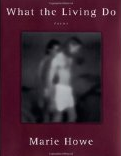 This weekend I was lucky to work with two brilliant poets, and in our conversation I referred to this poem by Marie Howe. I couldn’t remember the title, and I had just lent my copy of What the Living Do to another poet friend (I’ve posted the title poem before). But today I was visiting yet another poet friend for a civilized latte and scone moment, and she lent me her copy, so I can print this wonderful poem here:
This weekend I was lucky to work with two brilliant poets, and in our conversation I referred to this poem by Marie Howe. I couldn’t remember the title, and I had just lent my copy of What the Living Do to another poet friend (I’ve posted the title poem before). But today I was visiting yet another poet friend for a civilized latte and scone moment, and she lent me her copy, so I can print this wonderful poem here:
For Three Days
For three days now I’ve been trying to think of another word for gratitude
because my brother could have died and didn’t,
because for a week we stood in the intensive care unit trying not to imagine
how it would be then, afterwards.
My youngest brother, Andy, said: This is so weird. I don’t know if I’ll be
talking with John today, or buying a pair of pants for his funeral.
And I hated him for saying it because it was true and seemed to tilt it,
because I had been writing his elegy in my head during the seven-hour drive there
and trying not to. Thinking meant not thinking. It meant imagining my brother
surrounded by light–like Schrodinger’s Cat that would be dead if you looked
and might live if you didn’t. And then it got better, and then it got worse.
And it’s a story now: He came back.
And I did, by that time, imagine him dead. And I did begin to write the other story:
how the crowd in the stifling church snapped to a tearful attention,
how my brother lived again, for a few minutes, through me.
And although I know I couldn’t help it, because fear has its own language
and its own story, because even grief provides a living remedy,
I can’t help but think of that woman who said to him whom she considered
her savior: If thou hadst been there my brother had not died, how she might
have practiced her speech, and how she too might have stood trembling.
unable to meet the eyes of the dear familiar figure that stumbled from the cave
when the compassionate fist of God opened and crushed her with gratitude and shame.
Marie Howe
What I love about this poem is that she is doing with the poem just what she was doing on the long drive, and she acknowledges it, and yet it all seems so effortless, honest, and human.